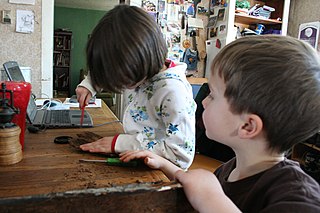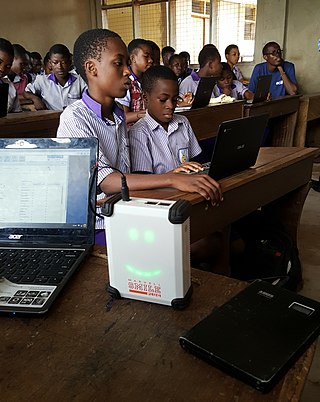The philosophy of education is the branch of applied philosophy that investigates the nature of education as well as its aims and problems. It also examines the concepts and presuppositions of education theories. It is an interdisciplinary field that draws inspiration from various disciplines both within and outside philosophy, like ethics, political philosophy, psychology, and sociology. Many of its theories focus specifically on education in schools but it also encompasses other forms of education. Its theories are often divided into descriptive theories, which provide a value-neutral description of what education is, and normative theories, which investigate how education should be practiced.
A Master of Business Administration is a postgraduate degree focused on business administration. The core courses in an MBA program cover various areas of business administration such as accounting, applied statistics, human resources, business communication, business ethics, business law, strategic management, business strategy, finance, managerial economics, management, entrepreneurship, marketing, supply-chain management, and operations management in a manner most relevant to management analysis and strategy. It originated in the United States in the early 20th century when the country industrialized and companies sought scientific management.

Unschooling is an informal learning method that prioritizes learner-chosen activities as a primary means for learning. Unschoolers learn through their natural life experiences including play, household responsibilities, personal interests and curiosity, internships and work experience, travel, books, elective classes, family, mentors, and social interaction. Often considered a lesson- and curriculum-free implementation of homeschooling, unschooling encourages exploration of activities initiated by the children themselves, under the belief that the more personal learning is, the more meaningful, well-understood, and therefore useful it is to the child. While unschooled students may occasionally take courses, unschooling questions the usefulness of standard curricula, fixed times at which learning should take place, conventional grading methods and standardized tests, forced contact with children in their own age group, the compulsion to do homework regardless of whether it helps the learner in their individual situation, the effectiveness of listening to and obeying the orders of one authority figure for several hours each day, and other features of traditional schooling.

The career is an individual's metaphorical "journey" through learning, work and other aspects of life. There are a number of ways to define career and the term is used in a variety of ways.

A teacher, also called a schoolteacher or formally an educator, is a person who helps students to acquire knowledge, competence, or virtue, via the practice of teaching.
Autodidacticism or self-education is education without the guidance of masters or institutions. Generally, autodidacts are individuals who choose the subject they will study, their studying material, and the studying rhythm and time. Autodidacts may or may not have formal education, and their study may be either a complement or an alternative to formal education. Many notable contributions have been made by autodidacts.

Tutoring is private academic support, usually provided by an expert teacher; someone with deep knowledge or defined expertise in a particular subject or set of subjects.

Pedagogy, from Ancient Greek παιδαγωγία (paidagōgía), most commonly understood as the approach to teaching, is the theory and practice of learning, and how this process influences, and is influenced by, the social, political, and psychological development of learners. Pedagogy, taken as an academic discipline, is the study of how knowledge and skills are imparted in an educational context, and it considers the interactions that take place during learning. Both the theory and practice of pedagogy vary greatly as they reflect different social, political, and cultural contexts.
Minimally invasive education (MIE) is a form of learning in which children operate in unsupervised environments. The methodology arose from an experiment done by Sugata Mitra while at NIIT in 1999, often called The Hole in the Wall, which has since gone on to become a significant project with the formation of Hole in the Wall Education Limited (HiWEL), a cooperative effort between NIIT and the International Finance Corporation, employed in some 300 'learning stations', covering some 300,000 children in India and several African countries.
M-learning, or mobile learning, is a form of distance education where learners use portable devices such as mobile phones to learn anywhere and anytime. The portability that mobile devices provide allows for learning anywhere, hence the term "mobile" in "mobile learning." M-learning devices include computers, MP3 players, mobile phones, and tablets. M-learning can be an important part of informal learning.
Business education is a branch of education that involves teaching the skills and operations of the business industry. This field of education occurs at multiple levels, including secondary and higher education
The Master of Library and Information Science (MLIS), also referred to as the Master of Library and Information Studies, is the master's degree that is required for most professional librarian positions in the United States. The MLIS is a relatively recent degree; an older and still common degree designation for librarians to acquire is the Master of Library Science (MLS), or Master of Science in Library Science (MSLS) degree. According to the American Library Association (ALA), "The master’s degree in library and information studies is frequently referred to as the MLS; however, ALA-accredited degrees have various names such as Master of Information Studies, Master of Arts, Master of Librarianship, Master of Library and Information Studies, or Master of Science. The degree name is determined by the program. The [ALA] Committee for Accreditation evaluates programs based on their adherence to the Standards for Accreditation of Master's Programs in Library and Information Studies, not based on the name of the degree."
Inquiry-based learning is a form of active learning that starts by posing questions, problems or scenarios. It contrasts with traditional education, which generally relies on the teacher presenting facts and their knowledge about the subject. Inquiry-based learning is often assisted by a facilitator rather than a lecturer. Inquirers will identify and research issues and questions to develop knowledge or solutions. Inquiry-based learning includes problem-based learning, and is generally used in small-scale investigations and projects, as well as research. The inquiry-based instruction is principally very closely related to the development and practice of thinking and problem-solving skills.
Educational inequality is the unequal distribution of academic resources, including but not limited to school funding, qualified and experienced teachers, books, and technologies, to socially excluded communities. These communities tend to be historically disadvantaged and oppressed. Individuals belonging to these marginalized groups are often denied access to schools with adequate resources. Inequality leads to major differences in the educational success or efficiency of these individuals and ultimately suppresses social and economic mobility. Inequality in education is broken down into different types: regional inequality, inequality by sex, inequality by social stratification, inequality by parental income, inequality by parent occupation, and many more.

NIIT Limited (National Institute of Information Technology) is an Indian multinational skills and talent development corporation headquartered in Gurgaon, India. The company was set up in 1981 to help the nascent IT industry overcome its human resource challenges. NIIT offers training and development to individuals, enterprises and institutions.
Adaptive learning, also known as adaptive teaching, is an educational method which uses computer algorithms as well as artificial intelligence to orchestrate the interaction with the learner and deliver customized resources and learning activities to address the unique needs of each learner. In professional learning contexts, individuals may "test out" of some training to ensure they engage with novel instruction. Computers adapt the presentation of educational material according to students' learning needs, as indicated by their responses to questions, tasks and experiences. The technology encompasses aspects derived from various fields of study including computer science, AI, psychometrics, education, psychology, and brain science.

London School of Commerce, fully accredited by Accreditation Service for International Colleges (ASIC) a member of Education UK. LSC was amongst first hundred colleges in the UK to be granted the Highly Trusted Sponsor status for Tier 4 student visa by the UK Border Agency. Founded in 1999 with the primary aim of providing cost-effective education leading to internationally recognized British degrees in Business Management and Information Technology. Students also have the opportunity to achieve their educational goals of Bachelor within two years.

The DO-IT Center is based at the University of Washington (UW) in Seattle, Washington. Founded in 1992, DO-IT’s mission is to increase the successful participation of people with disabilities in postsecondary education and careers, in STEM fields and careers, and in computing fields and careers throughout the U.S. It directs the national AccessSTEM program, and co-directs the national AccessComputing Alliance focused on engaging people with disabilities in computing fields.

Stanford Mobile Inquiry-based Learning Environment (SMILE) is a mobile learning management software and pedagogical model that introduces an innovative approach to students' education. It is designed to push higher-order learning skills such as applying, analyzing, evaluating, and creating. Instead of a passive, one-way lecture, SMILE engages students in an active learning process by encouraging them to ask, share, answer and evaluate their own questions. Teachers play more of the role of a “coach,” or “facilitator”. The software generates transparent real-time learning analytics so teachers can better understand each student's learning journey, and students acquire deeper insight regarding their own interests and skills. SMILE is valuable for aiding the learning process in remote, poverty-stricken, underserved countries, particularly for cases where teachers are scarce. SMILE was developed under the leadership of Dr. Paul Kim, Wilson Wang, and Rayan Malik.

Edgenuity, formerly Education2020 (E2020), is a standard-based online learning resource for school districts produced by Imagine Learning, which teaches kindergarten through 12th grade in core, elective, credit recovery, technical, and career subjects, through both remedial and accelerated work. As of 2019, Edgenuity serves more than four million students in the United States. Edgenuity also runs popular learning curriculum Time4Learning.










